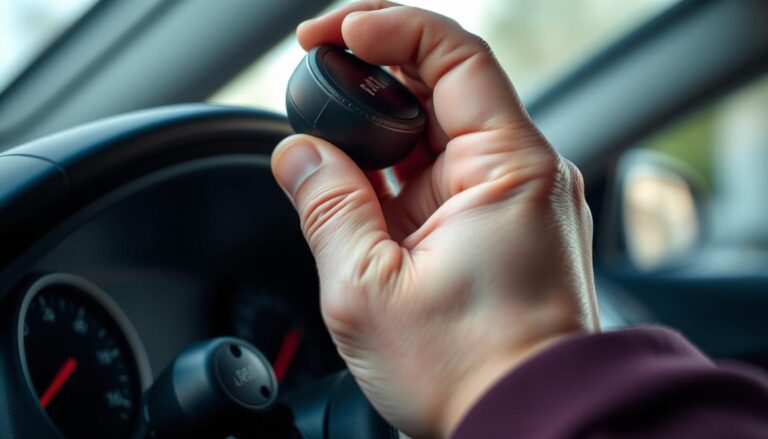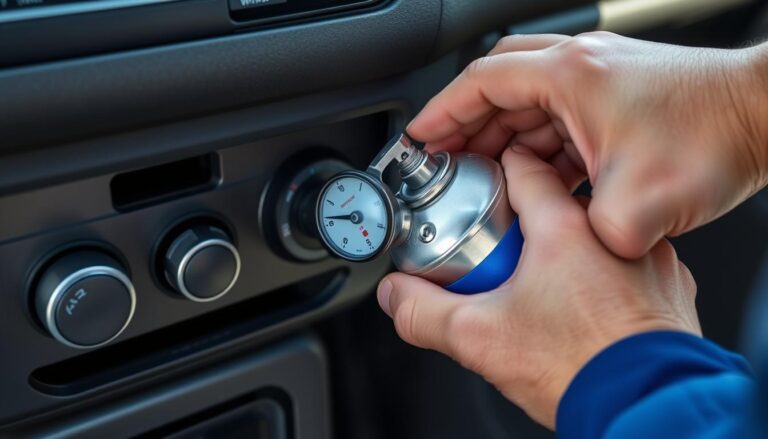Understanding the vehicles registered under your name is paramount for safeguarding your financial and legal standing. Ignorance of such registrations can precipitate unforeseen consequences, including unexpected fines or unforeseen liabilities.
Verifying vehicle ownership is a task of simplicity, yet it can avert considerable distress. By engaging in the process of checking vehicle registration, you can affirm that all vehicles bearing your name are authentic and current.
This discourse aims to elucidate the methodologies for verifying your vehicle ownership. It will equip you with the requisite knowledge to assert dominion over your registered vehicles.
Key Takeaways
- Understand the importance of verifying vehicle registration.
- Learn the steps to check vehicles registered under your name.
- Discover how to ensure your vehicle ownership records are up-to-date.
- Identify potential issues associated with unregistered or misregistered vehicles.
- Take control of your financial and legal security by verifying vehicle ownership.
Why You Might Need to Check Vehicle Registration
Engaging in a vehicle registration check is imperative to circumvent legal and financial predicaments. This verification process is vital for confirming that your vehicle is registered under your name, thus aiding in the detection of any discrepancies or unauthorized registrations.
Common Scenarios Requiring Vehicle Ownership Verification
Several scenarios necessitate the verification of vehicle ownership. For example, when engaging in the sale of a vehicle, it is crucial to verify that the registration is current and correctly transferred to the new proprietor. In instances of disputes over vehicle ownership, a clear registration record can expedite resolution. Verification can be conducted through your state’s DMV website, such as the New York DMV registration fee calculator.
- Transferring vehicle ownership
- Resolving disputes over vehicle ownership
- Updating registration information after a move
Potential Issues with Unverified Vehicle Ownership
Ignoring the verification of vehicle ownership can precipitate numerous complications. For instance, if a vehicle is not registered under your name, you may be liable for any traffic infractions or accidents involving that vehicle. Unverified ownership can also complicate the sale of the vehicle or the transfer of ownership.
| Issue | Description | Potential Consequences |
|---|---|---|
| Unregistered Vehicles | Vehicles not registered under your name | Legal and financial liabilities |
| Incorrect Registration | Errors in registration details | Difficulty in selling or transferring ownership |
| Unauthorized Registrations | Vehicles registered under your name without your knowledge | Potential fraud and identity theft |

How to Find Out What Cars Are in My Name: Quick Vehicle Ownership Guide
Unveiling the vehicles registered under your name entails a series of uncomplicated maneuvers. To initiate the process of checking car registration, several methodologies are at your disposal, each with its distinct prerequisites.
Overview of Available Methods
Verification of vehicle ownership can be achieved through various channels. The state’s DMV website offers an online platform, while a visit to a DMV office provides a more hands-on approach. Third-party vehicle history services also serve as viable alternatives. The selection of a method hinges on personal preference and the specific information sought.

Documentation and Information You’ll Need
The commencement of the vehicle ownership guide necessitates the presentation of specific documentation and data. This encompasses personal identification and details pertaining to the vehicle in question.
Personal Identification Requirements
A valid government-issued ID, such as a driver’s license or state ID, is typically required to authenticate your identity.
Vehicle Information That May Help
Providing the VIN (Vehicle Identification Number) or license plate number can significantly expedite the verification process. This information facilitates a precise and expedited search.
By adhering to these guidelines and compiling the necessary documentation for vehicle verification, you can efficiently ascertain the vehicles registered in your name.
Checking Vehicle Registration Through Your State’s DMV
Your state’s DMV serves as the primary conduit for vehicle registration inquiries, offering diverse avenues for accessing this data. Initiation of the process necessitates an understanding of the available channels and requisite documentation.
Required Documentation for DMV Inquiries
Before engaging with the DMV, it is imperative to possess the necessary documentation. Typically, one must present proof of identity, such as a driver’s license or state ID, alongside vehicle identification details like the VIN or license plate number.
| Document Type | Description | Example |
|---|---|---|
| Proof of Identity | Valid government-issued ID | Driver’s License |
| Vehicle Identification | Details identifying the vehicle | VIN or License Plate Number |
Step-by-Step Process for In-Person DMV Visits
For those who opt for a more traditional method, visiting the DMV in person is an option. A step-by-step guide is provided:
- Locate your nearest DMV office and its operating hours.
- Gather all required documents.
- Fill out the necessary forms, usually available at the DMV or downloadable from their website.
- Submit your request and wait for processing.
Online DMV Portal Options by State
Many states offer online portals for vehicle registration checks, enhancing convenience. These portals enable users to input their information and receive registration details directly.
Mail and Phone Request Procedures
For those unable or preferring not to visit in person or use online services, mail or phone requests are alternatives. Be prepared to provide the necessary details over the phone or include them in your mail request.
By grasping the processes and requirements, one can efficiently verify vehicle registrations through their state’s DMV, ensuring access to the most accurate and current information.
Using Online Vehicle Registration Services
Online vehicle registration services present a swift and efficient avenue for verifying vehicle ownership. Their popularity surges due to their convenience and accessibility, rendering them a preferred choice for many.
Reputable Third-Party Vehicle History Services
Several esteemed third-party entities offer vehicle history reports, encompassing registration details. Notable among these are:
- AutoCheck: Delivers detailed vehicle history reports, including registration information.
- Carfax: Presents comprehensive vehicle history reports, encompassing registration details.
- NHTSA: Furnishes data on vehicle recalls and safety ratings.
Costs and Benefits of Paid Services
Paid vehicle history services proffer several advantages, including detailed reports and rapid access to information. The pricing structure varies based on the service provider and the report type requested.
- Detailed Reports: Paid services deliver exhaustive reports, encompassing registration status, ownership history, and any outstanding recalls.
- Quick Access: Online services facilitate rapid access to vehicle information, thus saving time compared to visiting a DMV office.
How to Interpret Vehicle Registration Reports
Deciphering vehicle registration reports necessitates comprehension of the provided information. Key aspects to scrutinize include:
- Registration Status: Reveals whether the vehicle is currently registered and under whose name.
- Ownership History: Offers insights into previous owners and any registration changes.
- Outstanding Recalls: Warns of any safety recalls pending for the vehicle.
Free vs. Paid Options: What You Get
Both free and paid vehicle registration services present distinct advantages. Free services may offer basic information, whereas paid services provide more detailed reports.
- Free Services: May provide limited information, such as basic vehicle details.
- Paid Services: Offer comprehensive reports, including detailed registration information and vehicle history.
Addressing Special Circumstances
Special circumstances often complicate the verification of vehicle ownership, requiring a more refined approach. This is evident in scenarios involving vehicles no longer in one’s possession, those of deceased family members, or company vehicles. Each situation presents unique challenges in the process of checking vehicle registration.
Vehicles You No Longer Own But Are Still In Your Name
When a vehicle is sold but remains registered under the seller’s name, prompt action is imperative. Transferring ownership is critical to mitigate potential liabilities. This can typically be achieved by notifying the state’s DMV and submitting the required documentation.
Checking Registration for Deceased Family Members
Upon the passing of a family member, their vehicle registration status must be addressed. To update the registration status, you may need to present a death certificate and other pertinent documents to the DMV.
Company Vehicles and Business Ownership
For businesses, the verification of vehicle registration is more intricate, given the complexity of managing multiple vehicles and evolving ownership structures. It is essential for companies to maintain precise records of their fleet and ensure that registration information is updated in a timely manner.
| Situation | Action Required |
|---|---|
| Vehicles No Longer Owned | Notify DMV, transfer ownership |
| Deceased Family Member’s Vehicle | Provide death certificate, update registration |
| Company Vehicles | Maintain accurate records, update registration information |
Legal Considerations and Privacy Concerns
Understanding vehicle registration laws necessitates a profound comprehension of your rights and the safeguards designed to safeguard your privacy. As a vehicle proprietor, it is imperative to be cognizant of the legal frameworks and privacy issues pertinent to vehicle registration.
Your Rights Regarding Vehicle Registration Information
Specific rights pertain to your vehicle registration data. The Driver’s Privacy Protection Act (DPPA) mandates the protection of personal information amassed by state Departments of Motor Vehicles (DMVs). This federal legislation delineates who can access your data and for what reasons.
“The Driver’s Privacy Protection Act (DPPA) was enacted to protect the privacy of individuals whose information is collected by state DMVs.”
Protecting Your Vehicle Information from Fraud
To safeguard your vehicle data from fraudulent activities, vigilance is paramount. It is advisable to monitor your credit reports and be wary of unsolicited solicitations for personal information. Additional security measures, such as credit freezes, can also be considered.
| Protection Measure | Description | Benefit |
|---|---|---|
| Credit Monitoring | Regularly check your credit reports for suspicious activity. | Early detection of identity theft. |
| Credit Freeze | Restrict access to your credit report. | Prevents new account fraud. |
What to Do If You Find Unauthorized Vehicles in Your Name
In the event of discovering unauthorized vehicles registered under your name, prompt action is imperative. Engage with your state’s DMV to report the anomaly. You may be required to furnish documentation to affirm your identity and rectify the situation.
State-Specific Privacy Laws to Be Aware Of
While the DPPA establishes a federal framework, individual states possess their own privacy statutes concerning vehicle registration. It is advisable to acquaint yourself with your state’s specific regulations to comprehend the handling of your information.
Key Takeaway: Grasping your rights and proactively safeguarding your vehicle data is essential for preserving your privacy and security.
Conclusion
The verification of vehicle ownership stands as a pivotal step in the maintenance of accurate and secure vehicle registration data. This discourse has explored multiple avenues for conducting such checks, encompassing direct communication with state DMVs and leveraging online platforms dedicated to vehicle registration services.
Accurate identification of potential issues related to unverified vehicle ownership is facilitated through a comprehensive vehicle registration check summary. Such verification is imperative to circumvent complications arising from unauthorized vehicles being registered under one’s name.
Ensuring the security of your vehicle’s information necessitates periodic verification of your vehicle registration status. This can be achieved through direct contact with your state’s DMV or by utilizing established online services that offer detailed vehicle registration reports.
Adherence to the methodologies detailed within this article guarantees the precision and contemporaneity of your vehicle registration data. This, in turn, affords you a sense of security and safeguards against fraudulent activities.
FAQ
How do I check if there are vehicles registered under my name?
To verify vehicle registration under your name, consult your state’s Department of Motor Vehicles (DMV) or leverage online vehicle registration platforms. These resources facilitate the identification of vehicles registered in your name.
What information do I need to provide to check vehicle registration?
For vehicle registration verification, you must furnish personal identification, such as a driver’s license or state ID. Concurrently, provide vehicle-specific details, including the Vehicle Identification Number (VIN) or license plate number.
Can I check vehicle registration online?
Affirmatively, numerous states provide online DMV portals for vehicle registration checks. Third-party vehicle history services also offer online access to registration data.
What if I find out there’s a vehicle registered under my name that I don’t own?
Upon discovering an unauthorized vehicle registered under your name, immediately contact your state’s DMV. They will assist in rectifying the situation, guiding you through the necessary steps.
Are there any fees associated with checking vehicle registration?
Fees for vehicle registration checks vary by state. Some states offer this service at no cost, while others impose a fee. Third-party services may also demand a fee for their services.
How do I protect my vehicle information from fraud?
Safeguarding your vehicle information from fraud necessitates vigilance. Be judicious when divulging personal and vehicle details. Regularly monitor your credit reports and promptly report any suspicious activity to your state’s DMV.
Can I check vehicle registration for a deceased family member?
Yes, you can investigate vehicle registration for a deceased family member. You will, though, require additional documentation, such as a death certificate and proof of familial relationship.
What are my rights regarding vehicle registration information?
You possess the right to access and rectify your vehicle registration data. Engage with your state’s DMV to elucidate your rights and the procedures for accessing your information.
How do I interpret a vehicle registration report?
A vehicle registration report encompasses details such as the vehicle’s registration status, ownership particulars, and any outstanding liens or fines. For clarification on the report’s contents, contact the reporting agency or your state’s DMV.


